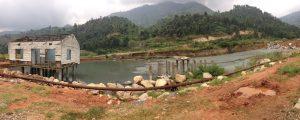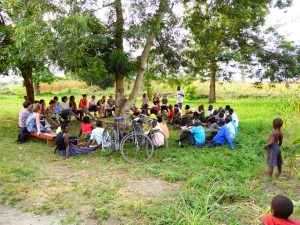From Yorkshire to Uganda: Exploring flooding responses and the possibilities of partnership learning
by Thea Soltau, HCRI MA Humanitarianism and Conflict Response
I live in the Calder Valley. Last semester at HCRI it would have taken me a little while to explain where I live to most students. On the 26th December 2015 as the severe flooding made headline news I only have to say ‘Hebden Bridge’ or ‘Todmorden’ and it brings to mind recent images of my community. It’s hard to describe the ‘position change’ from studying such events to ‘lived experience’ and the transfer was brutal. I had experienced the 2012 flooding in Hebden Bridge but the floods 8 weeks ago were much worse than anyone had anticipated.
 One thing which kept me going during the ‘aftermath’ of the flooding was the thought that I had the privileged opportunity to swop the devastation in the Calder Valley for the HCRI Practices research visit to Rwanda and Uganda including, ironically to study flood preparedness and responses. My experiences over Christmas had a profound affect on the content to this research and my emotional relationship to it.
One thing which kept me going during the ‘aftermath’ of the flooding was the thought that I had the privileged opportunity to swop the devastation in the Calder Valley for the HCRI Practices research visit to Rwanda and Uganda including, ironically to study flood preparedness and responses. My experiences over Christmas had a profound affect on the content to this research and my emotional relationship to it.
When we arrived in Uganda, apart from a rise in temperature there was little change in the weather as we discovered that El Nino was also affecting equatorial Africa with unseasonally heavy rainfalls. Amongst others, we met with Save the Children, the Minister for Disaster Response (Manchester Alumni) and MA disaster management students from Makere University to discuss flooding issues.
As we drove into the affected Kasese region I began to recognise similar landscape changes to the Calder Valley; evidence of landslides, alien deposits of boulders and debris amongst collapsed bridges, houses and roads. In addition to landscape transformations, Uganda’s changing extreme weather patterns are also similar to the UK.
 However, one of the striking differences was community preparedness and response to the floods. In an interlude from the rain HCRI students sat under a tree with members of the community who make up the area response team.
However, one of the striking differences was community preparedness and response to the floods. In an interlude from the rain HCRI students sat under a tree with members of the community who make up the area response team.
This gave me an opportunity to not only learn about local responses but also share stories and discover what we could learn from their experiences. Before I left for England the Calder Valley Flood Support FB page was dominated by two main themes. Firstly the impressive response coordination, and secondly the discussion about governmental responsibility for the floods. Asking, for example, how governmental actions (or lack of them) contributed towards the increased flooding hazard and who was responsible for prevention and preparedness?
Because the state infrastructure regarding health and welfare in Uganda is often inadequate communities have learned to focus on ‘sensitising our community to handle their own situations’. As a result 80% of flood responses are local initiatives and the area team told us they feel community resilience is very strong.
Two specific points stood out for me. Firstly, the inclusion of children in the flood preparation and learning (in partnership with Save the Children) In communities where children and young people often take a more active role this makes sense. They also see the children as having a learning and experience ‘archive’ in their heads which they carry throughout their lives and pass on to the next generation. Secondly, the communities are also working with Save the Children to put evacuation plans in place. This point particularly concerns me. Hebden is a busy tourist town and we have been fortunate that the recent floods happened when the streets were quiet and people were indoors. Should we be seriously considering evacuation strategies?
In addition to learning from local responses to risk, and debating top down versus local responses, what can we learn about their how their experiences of political infrastructures shapes their flood responses? Bringing Uganda into the conversation may seem a ‘left of centre’ approach but there is always a value in partnership working to exchanging ideas and experiences. As a result of the visit we have set up a FB page to exchange ideas with the Makere University students and I’m interested to see what unfolds.


0 Comments